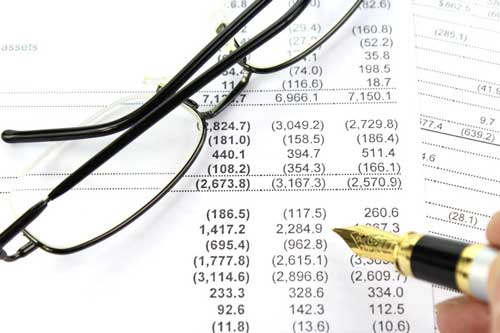Bookkeepers and accountants are the same thing, right? Wrong. This blog explains the important differences between the two.
It is a common misconception that a bookkeeper and accountant are one and the same thing.
It is true that they both work with businesses of all shapes and sizes to provide invaluable professional services. Their tasks may overlap, and both can be a critical aspect of managing the financial aspect of your business.
What does a bookkeeper do?
A bookkeeper will be the person who maintains the organisation and the smooth running of day-to-day financial situation.
Instrumental in the day-to-day running of your business, a bookkeeper can;
- Process invoices, receipts, payments and other financial transactions
- Provide credit control – in other words, they can keep on eye on clients who have paid and chase those that haven’t
- Process and maintain the business payroll system
- Prepare initial financial statements
- Reconcile accounts and prepare what is known as ‘reconciliation reports’
- Pay the invoices owed by the business
Bookkeepers are the people who keep the finances of the business up to date and in order. The information they maintain is the financial information that your accountant will use to provide more detailed financial advice and support for a business.
What does an accountant do?
The accountant is the professional who will use the information the bookkeeper pulls together and analyses it. From this, they will produce reports and use it to give you in-depth financial advice.
They also have an in-depth understanding of the taxation system and requirements. There are changes in tax rules that can make understanding tax difficult. Accountants will often specialise in certain aspects of financial expertise, one of which can be tax.
Tax is often a major concern of business, especially as you grow and your tax liability increases.
Advisory and analytical in nature, the professional services provided by an accountant may include;
- Tax advice and planning
- Other financial services such as raising funds, investment and so on
- Auditing is also something you may require from an accountant
- Corporate planning and compliance
- Pension advice and planning
- General financial management advice
This is not an exhaustive list with different businesses needing different accountancy services.
Does a business need a bookkeeper and an accountant?

It depends on your own personal preference, as well as the size and complexity of the financial status of your business.
Larger businesses tend to employ a bookkeeper either as a salaried employee or on a freelance basis to keep the financial status of their business up to date. A bookkeeper can make a huge difference in how well organised a business is.
The simple but important tasks such as getting invoices out on time, tracking payments and paying of bills are essential for maintaining the cash flow of a business, effectively its lifeblood.
An accountant can be the professional who ‘saves’ money on your tax bill, ensuring that you meet tax obligations and responsibilities, but that you also maintain a healthy profit.
They are the people who have a deeper, analytical understanding of the financial nature of your business and can be instrumental in understanding the value of your business and driving it forward.
Both a bookkeeper and an accountant have their place in any business, which is why so many businesses across the UK rely on one, either or both.
What about qualifications?
Essentially, a bookkeeper and an accountant will hold different qualifications.
A bookkeeper can hold a basic qualification which essentially ensures that they can keep the books in the order that is laid down in the business financial rulebook.
Higher levels of bookkeeping qualifications mean that they can competently perform more tasks, producing more complex reports and so on.
An accountancy course can work in a similar way with some accountants choosing to build their expertise with courses and professional practice. As well as generic accountancy qualifications, an accountant will often specialise too. A chartered accountant is one who has followed the academic path to becoming an accountant.
Do a bookkeeper and accountant work together?
Yes, because the services of both bookkeeper and accountant dovetail neatly within a business with the accountant relying on the information produced by the bookkeeper to provide their services. In return, the bookkeeper will rely on the accountant for providing guidance on what financial information needs to be collected.
Neither is mandatory for a business, but most business owners would agree, they would be in a much poorer position if it wasn’t for the bookkeeper and the accountant.
In the UK, it is a legal requirement for all businesses to keep accurate and up to date financial records. This applies to all businesses, from sole trader to global corporations.
If they fail to this, it is a serious offence, resulting in fines and extreme cases, imprisonment. Therefore, it is vital for any business to not only understand their financial responsibilities but to ensure that they adhere to the rules set.
The services of a bookkeeper for any business is not to be underestimated. For many qualified bookkeepers, it provides the opportunity to work for themselves and with businesses across all sectors and industries is a rewarding challenge.
Is now the right time to become a bookkeeper?
In recent years, the economy has faltered and stalled, taking large and small businesses to the brink – some have folded, with large, well-known brands and household names becoming victim to the recession.
With recessions comes loss of jobs, and hard economic times for many businesses. On one hand, they pull as many outsourced activities back within the firm as they can to reduce running costs but there is one constant that many companies have learnt to keep hold of – the bookkeeper.
In the UK, there are thought to be millions of sole traders, over a million limited companies and half a million partnerships. All of these will need their finances to be kept in order and with business gurus advising businesses that tight financial planning is a contributor to ongoing success, there is a ready market for bookkeepers.
With an estimated 3,000 registered bookkeepers in the UK, there is a need for qualified and experienced bookkeepers thus, the time IS right to take the plunge and become a bookkeeper.
Being a bookkeeper – Qualifications & personal attributes
The good news is that you don’t need a string of GCSEs and A levels or a degree to become a bookkeeper.
What you do need, however, is logic and common sense. You also need to be able to focus and concentrate for long periods – many practising bookkeepers say that they see bookkeeping as a puzzle to be solved – as well as have an eye for numbers and ‘patterns’.

You don’t need a string of GCSEs and A levels or a degree to become a bookkeeper
It is a respected profession and one in which over time, you will develop knowledge and understanding of different kinds of business. This means that you will be able to understand how a company manages it finances.
You can use the latest methods and technologies to feedback to businesses what they are spending their money on. In some instances, seeing these figures in the cold light of day can be the catalyst a business needs to drive through efficiency measures.
Regarding qualifications, a Level 2 course should be sufficient in helping you acquire a role in an industry in how to become a bookkeeper. This is a GCSE level course that provides the foundation on which to carry on building your own business as an accountant.
Many people choose to complete a Level 2 Bookkeeping and Accounts course, followed by a Level 3 course. There are also bookkeeping courses that provide a great introduction to the profession if you are looking to dip your toes in and see if this is something that you would like to explore further.
There are also Level 4 courses linked to bookkeeping, as well as specialist courses that can also make your services invaluable such as payroll management and self-assessment tax returns.
Making a living as a bookkeeper
Many people do make a living from keeping the books of many businesses, both small and large and across all sectors. In many ways, bookkeeping is not just about tallying numbers in columns but about creating relationships with your clients. Companies will come to rely on you as their bookkeeper for financial information.
Having the backing of an organisation can help too. The Institute of Certified Bookkeepers, for example, is the largest bookkeeping organisation in the world. It offers professional qualifications that are updated to fall in line with changes in accounting and finance laws as they relate to UK businesses.
Being a member of this body will be essential if you are planning on being a self-employed bookkeeper. There are all kinds of financial responsibilities on a business, many with legalities attached to them. As a business grows, it needs to keep a close eye on its finances, from monitoring spending to ensuring that fraud is also not compromising its operations.
Thus, any business from the smallest to the largest company will take bookkeeping services seriously. If you do have an eye for numbers and think bookkeeping may be the profession for you, then why not take a look?
